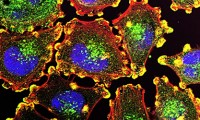-
Two Antipsychotic Drugs Destroy Cancer Cells
- Source: MedicalNewsToday
- 881
- August 1, 2018
-
Endomag Breast Cancer Device Gains FDA Approval
- Source: The Verdict
- 1,073
- August 1, 2018
-
Blood Test to Suggest Best Possible Treatment for Advanced Prostate Cancer
- Source: ScienceDaily
- 1,033
- July 26, 2018
-
Valsartan Based Drugs Recalled by FDA
- Source: HealthLine
- 1,213
- July 26, 2018
-
Mersana’s Lead Cancer ADC Held Up by FDA for Patient’s Death
- Source: FierceBiotech
- 434
- July 25, 2018
-
Karyopharm Seeks FDA Approval for Selinexor Drug for Multiple Myeloma
- Source: MedCityNews
- 578
- July 24, 2018
-
Study Unravels New Protein Complex that Repairs Broken DNA Ends
- Source: News Medical
- 1,141
- July 23, 2018
-
Magnetic Wire Detects Cancer Cells in Flowing Blood
- Source: The Verdict
- 783
- July 21, 2018
-
New Molecule Designed to Fight Cancer
- Source: ScienceDaily
- 1,006
- July 19, 2018
-
Hidden Blood in Stool Could Predict Fatal Health Conditions
- Source: MedicalXpress
- 953
- July 18, 2018
your submission has already been received.
OK
Subscribe
Please enter a valid Email address!
Submit
The most relevant industry news & insight will be sent to you every two weeks.













